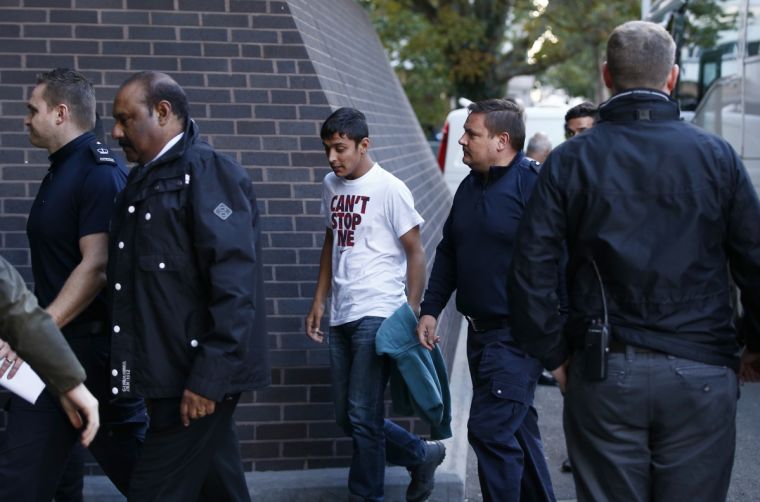Why Our Refugee Policy Needs To Be Driven By Compassion, Not Cruelty

This week, more than 100 refugee children will move to the UK to be reunited with their families. Having made the perilous journey from as far away as Syria and Afghanistan, fleeing war, violence and persecution, they will finally be with their relatives again, and able to begin piecing together some semblance of a normal childhood. No doubt traumatised, it will be a long and painful process.
They are among the first of hopefully many more to come – the Red Cross has identified at least 178 children living in the Calais 'Jungle' refugee camp as eligible to live in the UKdue to having close relatives here.
Hundreds more are eligible under the Dubs amendment – an amendment to the Immigration Bill tabled by Labour peer Lord Alf Dubs earlier this year, under which unaccompanied refugee minors in Europe can legally be relocated to the UK.
Sadly, even more children are not able to legally move to Britain, and have been abandoned to the squalor of the camp, soon to be demolished, with nowhere to go. According to charity Help Refugees, there are more than 1,000 unaccompanied minors living in the 'Jungle', under constant threat of sexual violence, abuse and human trafficking. Our failure to help them is a national disgrace.
But we must celebrate the small victories. Fourteen teenage boys arrived in Croydon yesterday, all of them aged between 14 and 17. The brother of 14-year-old Aimal Khan told the Press Association how excited he was to see his younger sibling again.
Asif, 25, fled Afghanistan in 2005, but Aimal stayed behind. The 14-year-old made it to Calais in the spring, but has until now not been able to travel to the UK to be with his brother.
"I really appreciate this. It was a blessing to receive him from there – I'm really happy," Asif said ahead of Aimal's return. "His journey was so difficult, it was by walking, by bus to Calais. He gets a new life now, because there are many people who died in Calais... I will just hug him because I haven't seen him since I left – I just miss him."
It's heart-warming to know that the result of relentless campaigning by human rights groups is brothers like Asif and Aimal getting to be with one another again. Though it's been a slow process, it's Britain's willingness to act on behalf of the poorest and most vulnerable that makes it worthy of the title 'Great'.
And yet David Davies, Conservative MP for Monmouth, said on Twitter of the refugees' arrival: "These don't look like 'children' to me. I hope British hospitality is not being abused."
According to the Telegraph, he added: "These young men don't look like minors to me. They are hulking teenagers who look older than 18. I'm all for helping the genuine children but the well of goodwill is rapidly being exhausted here.
"I'm also curious that there are no young women – I would have thought they would be much more vulnerable. I worry that once again British hospitality is being abused.
"There is no way of knowing if someone is a child. We could end up causing even more misery if we are not careful. We should invite anyone who wants to come to the UK to take dental tests."
It's an extraordinary example of total ignorance. There are very few women in the Calais camp in part because of the difficulty of the journey to get there. The Home Office confirmed it carried out stringent checks to verify the boys' ages, working "closely with the French Authorities to ensure that the cases applying to come to the UK qualify".
"Initial interviews are conducted to gather information on identity, medical conditions and age among other criteria," a spokeswoman said, and documents were provided by each of the boys to prove their age.
For Davies to chime in with criticism is entirely unnecessary, even cruel. The boys have already arrived – his comments can only serve to contribute to the anti-immigrant sentiment that has risen dramatically since Brexit.
As for Britain's "well of goodwill", the UK has taken in only around 80 children under EU asylum law this year. We can and must do much more. This shouldn't even be about "goodwill" or wanting applause for doing the right thing. It's about simple human decency, and extending the right to live free from fear to children who have been through unimaginable suffering.
It's not the first time Davies has spoken on this – he previously criticised Archbishop Justin Welby's call for the UK to welcome more refugees. In an article on his website in January, Davies said: "How wonderfully saintly it must feel to sleep at night with an easy conscience knowing you have roundly condemned the wicked politicians and bigots who worry about mass migration without actually having to take difficult decisions yourself and live with the consequences."
There's no doubt that politicians have a very difficult job with regards to immigration policy. But Davies, sitting behind his comfortable desk, would do well to look beyond the "hulking" bodies of these teenage boys, and consider that compassion is usually the best place to start.











